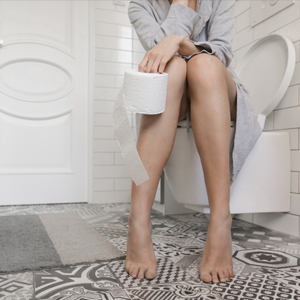
Perhaps you don’t like pooping in public bathrooms or at work, so you decide to hold back the urge to go until you’re in the comfort of your own bathroom. But, is that even a good idea? We decided to investigate.
Firstly, what is poop?
About 75% of your poop is water – the rest is made up of dead bacteria that help digest food, living bacteria, protein, undigested food, waste material from the food, fats, salts and substances released from the intestines and liver.
The amount of water in your poop will vary, and the longer the it stays in the intestine, the less water it will contain.
According to Dr Robynne Chutkan, a gastroenterologist at Georgetown Hospital and author of Gutbliss and The Microbiome Solution, “The ideal stool is a deep chocolaty colour – like melted chocolate."
She adds that it should be easy to pass – “almost effortless” – and should take the shape of a continuous log or two, with a diameter roughly the size of a circle you can make with your index finger and thumb. Healthy poop should sink – floating poop can be a sign of poor nutrient absorption or excessive gas.
Why it’s not a good idea to hold it in
Ignoring the urge to go can result in constipation. Gastroenterologist Dr Sarina Pasricha told Fatherly, “If people continue to ignore the urgency to go to the bathroom they can develop constipation. The nerves in the rectum can become damaged and respond inappropriately to stool in the rectum. In essence, your brain stops responding to the urge.”
She says a common risk associated with holding your poop in is rectal hyposensitivity, which causes your rectum to become desensitised and requires more poop before it lets your brain know it’s time to go. “The anal muscles tighten up instead of relaxing when you try to have a bowel movement,” Dr Pasricha says. In severe cases this can cause problems with urination and painful sex for women.
Rebecca Lee, a registered nurse, agrees. “When you hold in your poop, these same muscles send a signal to your brain to stop responding and can lead to slower emptying of the colon in the future.”
"Holding your poop can result in distended bowels and problems with normal stooling in the near future," Dr Spencer Nadolsky, a family physician told Greatist. He added that the bowels can reshape over time. Another problem with holding your poop in – when your muscles send a signal to your brain not to poop, it can cause a slower emptying of the colon when you are ready.
And farts? "Holding farts in isn't as bad, because it is air that needs to be released," says Alison Chen, ND (Naturopathic Doctor) and author of What Your Poo Says About You. “But it is still pressure that is building up inside,” which we all know can be pretty uncomfortable.
What happens to your body
A few hours
At first you may feel some abdominal pressure. “Some people describe it as abdominal cramping, whereas some people have more urgency,” Dr Niket Sonpal, assistant clinical professor at Tuoro College of Osteopathic Medicine in New York, told Women’s Health.
Six hours later
At this point, your body starts to impact your poop, which is not good – your body absorbs more water from the stool, which makes it harder to expel. Dr Sonpal says you may lose the urgency to go but don’t think it’s magically disappeared from your body – you’re actually on your way to becoming constipated.
12 hours later
“The longer the stool stays in, the harder it gets,” says Dr Sonpal. By now your belly might look distended – as hard as you try, you cannot keep it flat due to the pressure buildup. When you do finally make it to the bathroom, Dr Sonpal says it’s going to be an uncomfortable experience that may include straining, bleeding or even small tears around your anus.
12 or more hours later
“I’ve never heard of anyone dying from holding poop, but in adults, voluntarily holding it in is just going lead to impaction where the stool is rock hard,” says Dr Sonpal. If it gets impacted enough, your options include laxatives or a manual removal… “Go to the bathroom when your body is telling you,” Dr Sonpal says. If you can’t get to a bathroom right away, definitely make it a priority in the first few hours.”
The good news
Fortunately, if you only hold your poop in occasionally (when you can only find a dirty public bathroom, for example), you won’t cause any lasting problems. It’s when you do it repeatedly that it can causes issues like constipation. “Holding it is OK once in a while, but should definitely not become habit or a regular occurrence,” says Dr Pasricha. “People may not realise it is a problem until they start to develop damage to their muscles and nerves.”
The bottom line is we all need to poop, so don’t be embarrassed if the urge hits you after your second cup of coffee at the office.
Image credit: iStock



 Publications
Publications
 Partners
Partners











